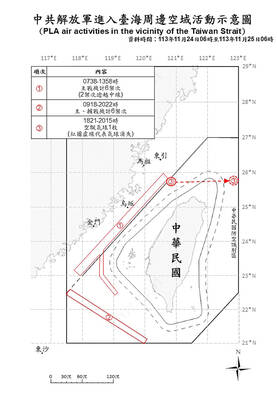The Ministry of Environment yesterday said it is eyeing stricter regulation of solid recovered fuel (SRF), and would follow EU standards to classify various categories of SRF, in response to pollution and other concerns.
SRF is created from combustible components of waste, including plastics, biodegradable material, paper and metal, which could come from municipal solid waste, or from commercial and industrial sources.
The material is burned in incinerators to generate energy in Taiwan.

Photo: Chan Shih-hung, Taipei Times
However, when questioning Minister of Environment Hsueh Fu-sheng (薛富盛), lawmakers yesterday cited disregard of regulations by producers and pollution issues, including alleged contamination by dioxins and other
toxic materials,
Hsueh acknowledged past pollution and other problems, saying that the ministry would impose more rigid control measures.
These would include classifying SRF into categories by applying EU standards and mandating more inspections to boost SRF sampling and testing capacity, Hsueh told lawmakers at a meeting of the legislature’s Social Welfare and Environmental Hygiene Committee.
Chinese Nationalist Party (KMT) Legislator Tu Chuan-chi (涂權吉) said that Taiwan currently has 53 SRF producers and 11 firms that do SRF incineration.
Many of them are located in Taoyuan, where residents have complained of pollution and poor air quality, Tu said.
Democratic Progressive Party Legislator Lin Shu-fen (林淑芬) said that serious efforts are needed to oversee SRF, and questioned the ministry’s current push to pass a draft “waste resource circulation promotion act.”
“Provisions in the bill would change the term ‘waste material’ (廢棄物) into ‘waste resource’ (廢棄資源). We believe if this is passed, then unscrupulous businesses will bury industrial waste in landfills and label contaminated waste as SRF to burn at incinerators,” Lin said.
“We must control and reduce the volume of industrial waste at the source, and must not allow unchecked materials labled as SRF to enter incinerators,” she said.
“Due to a lack of monitoring, Taiwan’s SRF materials used to generate energy are of much lower quality when compared to the EU, Japan and South Korea,” she added.
Hsueh said that in the past there was no classification for SRF material sources and checks were only made after production.
Now, the ministry is to take a page from the EU to require classification for SRF sources, he said.
In addition, whereas new producers previously only had to submit a document for business operation, they would now need to undergo a three-stage evaluation starting with submitting documents, then an on-site inspection and a check on initial pilot operations, he added.
Together with other lawmakers, Lin raised a motion demanding that Hsueh outline programs by his ministry “for enhanced monitoring, inspections and guidance on SRF producers,” and to table a report with the legislature within one month.
Legislators also required ministry officials to address pollution and other problems by drafting standards for SRF incineration emission levels and working with Ministry of Economic Affairs officials to conduct checks at all SRF producers and incinerators, with a report detailing the results to be submitted within two months.
“SRF will not be allowed to be sourced from sludge or imported waste, and international standards on mercury level will be applied along with stricter classification checks,” Resource Circulation
Administration Director-General Lai Ying-ying (賴瑩瑩) said, adding that the measures would be formally announced by the end of the month.

Theaters and institutions in Taiwan have received 28 threatening e-mails, including bomb threats, since a documentary critical of China began being screened across the nation last month, the National Security Bureau said yesterday. The actions are part of China’s attempts to undermine Taiwan’s sovereignty, it said. State Organs (國有器官) documents allegations that Chinese government officials engage in organ harvesting and other illegal activities. From last month to Friday last week, 28 incidents have been reported of theaters or institutions receiving threats, including bomb and shooting threats, if they did not stop showing the documentary, the bureau said. Although the threats were not carried out,

HEALTHCARE: Following a 2022 Constitutional Court ruling, Taiwanese traveling overseas for six months would no longer be able to suspend their insurance Measures allowing people to suspend National Health Insurance (NHI) services if they plan to leave the country for six months would be abolished starting Dec. 23, NHIA Director-General Shih Chung-liang (石崇良) said yesterday. The decision followed the Constitutional Court’s ruling in 2022 that the regulation was unconstitutional and that it would invalidate the regulation automatically unless the NHIA amended it to conform with the Constitution. The agency would amend the regulations to remove the articles and sections that allow the suspension of NHI services, and also introduce provisional clauses for those who suspended their NHI services before Dec. 23, Shih said. According to

‘GRAY ZONE’ TACTICS: China continues to build up its military capacity while regularly deploying jets and warships around Taiwan, with the latest balloon spotted on Sunday The US is drawing up contingency plans for military deployments in Japan and the Philippines in case of a Taiwan emergency, Japan’s Kyodo news agency reported. They would be incorporated in a first joint operation plan to be formulated in December, Kyodo reported late on Sunday, citing sources familiar with Japan-US relations. A US Marine Corps regiment that possesses High Mobility Artillery Rocket Systems — a light multiple rocket launcher — would be deployed along the Nansei Island chain stretching from Kyushu to Yonaguni near Taiwan, Kyodo said. According to US military guidelines for dispatching marines in small formations to several locations,

As Taiwan celebrated its baseball team’s victory in the World Baseball Softball Confederation’s Premier12 on Sunday, how politicians referred to the team in their congratulatory messages reflected the nation’s political divide. Taiwan, competing under the name Chinese Taipei (中華台北隊), made history with its first-ever Premier12 championship after beating Japan 4-0 at the Tokyo Dome. Right after the game, President William Lai (賴清德) congratulated the team via a post on his Facebook page. Besides the players, Lai also lauded the team’s coaching and medical staff, and the fans cheering for them in Tokyo or watching the live broadcast, saying that “every